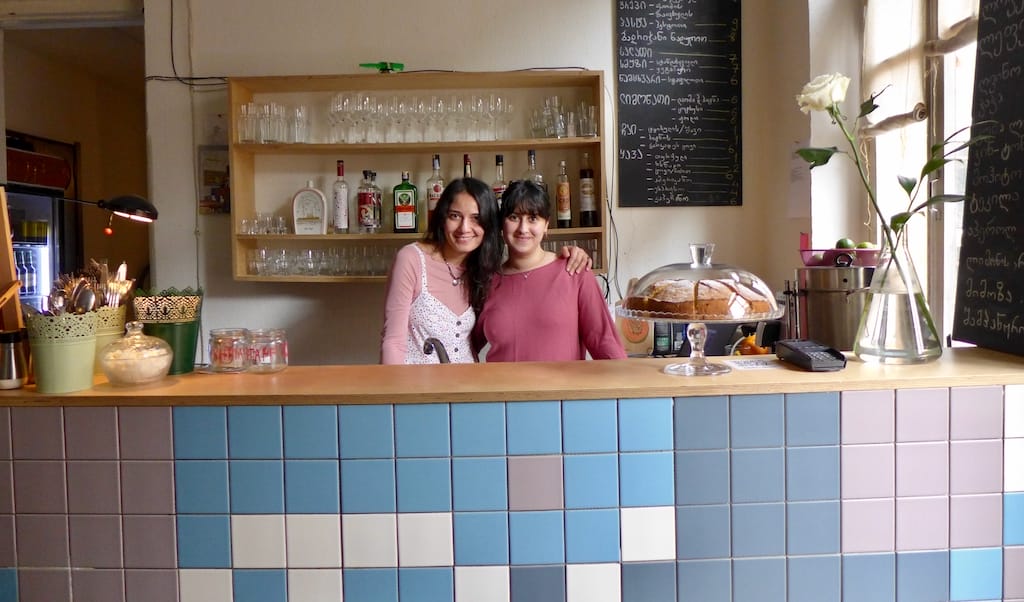Aghmashenebeli avenue – the main street on the left bank of the Mtkvari River – is well-known for its Turkish eateries and the presence of Barbarestan, a popular Georgian restaurant. But a handful of new food joints have opened recently, serving mainly Indian and Middle Eastern food, and sometimes a mix of both.
One of these new spots is Beirut Saj, which opened in April 2022. The venue is easy to miss when walking along the never-ending Aghmashenebeli avenue – its entrance is discrete and you have to take a few steps down to enter. A hint that you’ve arrived at the right place is the sight of barber shops. A Turkish barber is located upstairs, and next door, in the basement, is a Lebanese barbershop called Miami.

When we entered Beirut Saj, we were welcomed by the sweet and melancholic melodies of Fairuz – the timeless Lebanese diva – and the warm greetings of Beirut Saj founder Elie El Sabbagh.
A former nurse, the 37-year-old entrepreneur had no prior experience in the hospitality industry before coming to Georgia in September 2021. “I was just preparing meals for cousins and family, and I was watching culinary TV shows. Food was a passion, but I did not have a chance to start something in Lebanon,” he says, sitting at one of the four tables where he hosts customers.

“When the economic crisis hit in 2019, I planned to go out of Lebanon and do something I love,” he added. For Lebanese nationals who do not hold another passport, options to travel and resettle abroad are limited. Georgia is among the very few destinations where they can both enter without a visa and easily open a business.
“My salary used to be 1700 dollars, and it was about 40 dollars before I came here,” he says. Like many Lebanese people, El Sabbagh lost access to all his savings that are frozen in his accounts due to extreme capital control measures imposed by banks. Before moving to Georgia, he had to sell a property to get a bit of money to invest in kickstarting a business.
He also attended a six-month online course in food and beverage business management, a time he used to refine his idea: “I was thinking about making something new. None of the other Lebanese restaurants in Tbilisi did the saj concept. You can do many things in a saj oven, like bake your bread, make wraps, sandwiches, and manakish,” he said, pointing at the pizza-like dish served on the next table. “This is manakish kofta, the dough is topped with minced meat, onions, parsley, tomato, and mayo. It is delicious!”

Saj is popular across the Middle East. It is a thin flatbread prepared with wheat flour on an eponym convex metal griddle. Due to the small size of the kitchen, El Sabbagh could only place a small saj oven on the kitchen counter at his restaurant. He hopes one day to have a bigger venue and get a bigger oven like those of street sellers in Beirut, which can bake multiple pieces of bread simultaneously.
“I try to do things that don’t need too much preparation, because this is a small kitchen,” El Sabbagh tells us. Behind a counter, two chefs are preparing the meals in a narrow space. In just a few square meters, they navigate between a saj oven, a sink, a griddle, a deep fryer, a blender to prepare dips and a countertop to cut ingredients.
On the wall opposite the kitchen, Beirut Saj’s menu is displayed on a TV. Meals are written in Latin, Arabic, and Russian letters (and Georgian on request, because not all the translations could fit on one screen), reflecting the mixed background of the customer base: Lebanese regulars, tourists from Arab countries, new Russian-speaking residents, as well as Georgian and expat foodies.

The restaurant’s saj bread is served with traditional toppings such as za’atar (a popular mix of spice and herbs whose main ingredient is wild thyme) or labneh (strained yogurt) or as a wrap with chicken, soujouk (beef sausage), and kafta (minced meat). Other Lebanese staples are present on the menu such as houmous, mtabbal (eggplant dip), foul (fava bean stew), along with more international dishes such as pasta, pizza and burgers.
We ordered two of the most iconic Lebanese salads: tabbouleh and fattoush made with fried pieces of bread, mixed greens and tomatoes. The tabbouleh was fresh and perfectly seasoned with a slice of lemon. The fattoush was crispy as it should be and had a subtle sweet and sour taste brought by the pomegranate molasses and the sumac spice.

As main dish, we ordered one of El Sabbagh’s favorites, the chicken tawouk wrap. The meat is first marinated for 48 hours in a sauce of spices, garlic and tomato paste. Then, the cook puts it quickly on the grill before laying the pieces across a saj bread that has been filled with garlic paste and chopped coleslaw. Before wrapping it, he adds a few French fries, the perfect contrast to the stronger tastes of the whipped garlic paste that accompanies it and the spicy marinade. Life in Tbilisi might not be as tumultuous as it is in Beirut, but this is the type of comfort food that relieves you after a tiring day working and commuting across the city.
“I am creating as much authentic taste as possible,” says El Sabbagh, who got many of his recipes from friends and relatives living in Lebanon’s northernmost region, Akkar. “What is hard is getting imported ingredients, such as za’atar.”
Za’atar is essential in making manakish and seasoning many other dishes. El Sabbagh has managed to secure some imports either directly from his homeland or from Armenia, where newly settled Lebanese-Armenians have started growing thyme. But he had to get more creative to replace halloumi, the Eastern Mediterranean chewy cheese, by mixing three to four locally available types of cheese, including mozzarella and its Georgian counterpart sulguni.

As Beirut Saj will soon turn one year, Elie El Sabbagh thinks about making some improvements – adding a few extra items on the menu such as stuffed grape leaves, offering desserts and changing the interior design to accommodate more tables for the tourism season.
Following the Russian invasion of Ukraine, his business was also impacted by Tbilisi’s rising rents and global food inflation, but he is not looking back. “I like Georgia because it somehow relates to Lebanon’s nature and climate,” he says. “But it’s better in many ways. We have electricity here, we have public transportation, tourism, even more discipline, stability, and security.”
In the cosmopolitan Aghmashenebeli avenue food scene, Beirut Saj stands as a small piece of Lebanon abroad which even embodies a more livable version of it.
Clément GirardotClément Girardot
Published on March 27, 2023
Related stories
October 25, 2023
Tbilisi | By Clément Girardot
TbilisiFrom the bustling Melikishvili Avenue, we ascended a few steps to arrive at Praktika. The venue features three rooms adorned with white walls, well-worn parquet flooring, and standard-issue tables and chairs. Its resemblance to study rooms is no coincidence; Praktika is situated just a stone's throw away from Tbilisi State University, the city’s largest university,…
September 28, 2023
Tbilisi | By Clément Girardot
TbilisiTbilisi’s Lilo district is the place to go to find just about anything at a more affordable price; it's not only the largest market in the city but also in the entire country of Georgia. However, the downside is its location, situated about 12 miles away from the city center. A few months ago, a…
July 5, 2022
Tbilisi | By Pearly Jacob
TbilisiFollow a narrow alley radiating off the newly renovated Lado Gudiashvili square whose surrounding rebuilt period houses now exudes the tourist-attracting pastiche pleasantness of reconstructed historic centers, and you’ll stumble upon Uzu House, the sole standing habited ruin left on Saiatnova street. Uzu means “vortex” in Japanese, explains Yamato Kuwahara, the reticent founder of the…























































































